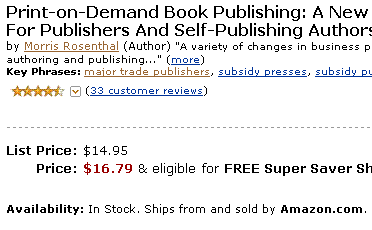I finally found a good excuse to procrastinate finishing the book I've been working on since April. I'm taking a break to write a book about how authors can build a platform with a traditional website. I knocked out an outline in an hour or two, which is always a good sign, and I walk around mumbling catchy lines to myself that I promptly forget since I don't carry a notebook. Anyway, when you read the online bits and say, "this isn't very good", remember that it was terrific when it occurred to me, I just have a bad memory.
My week at the Cape Cod Writers Conference is what put me over the top on starting this book, and I believe I'm passionate enough about the subject to see it through without interruptions. From my correspondence, discussion group reading and the odd news story, it's always been clear that there's a tremendous amount of misleading information out there as to how a website can function as an author platform, what it should consist of, how it can be built and what it will cost. Oh, and the small matter of what an author can expect to accomplish with a website.
There are almost unlimited ways for writers to raise their profiles online these days, from home made videos of publicity stunts to social networking and constantly commenting on discussion lists and blogs. I'm not going to be writing about any of that, except in the context of comparisons. All of those activities are a great way to do book publicity, if you have the patience and the nerve, but they rarely qualify as platform building. It's also important to note that the work you do in communal spaces will always be under certain limitations in content and structure that the host website places on users, and you won't have access to the vital statistics that come with owning your own website.
A platform, in the publishing world, is like a professional degree, affiliation, and a regular place on a speaking circuit all combined. The platform needs to ensure that readers find you and to establish that you're somebody worth reading. Blogging can play a part in this, but for most authors, a traditional, static website provides a better foundation. Yet traditional websites have been declared dead by the visionaries of the 21st century, who are endlessly pushing for the next level of technological engagement. The irony, of course, is that books themselves are printed on static media, paper. In most cases, readers would be very disappointed if they returned to the favorite novel to find that little Nell is now murdered in chapter 2, or their guru has changed the path to Nirvana so that anybody who followed the previous path for even a day is now doomed to perpetual unenlightenment.
I don't see this as a book that will have much sales potential, so I plan to have fun with it and not pull any punches. The main reason I'm convinced it won't find favor with aspiring authors or those who are published and looking to increase their sales is that I'll be laying out an approach that can take years to fully mature. Developing a meaningful web platform requires foresight on the part of authors, while most of the authors I hear from think foresight means sending out paid press releases a month after their book appears and fails to sell. As usual, my as-of-yet untitled book about the
author website as a platform is posted online as I write. Enjoy the typos.
